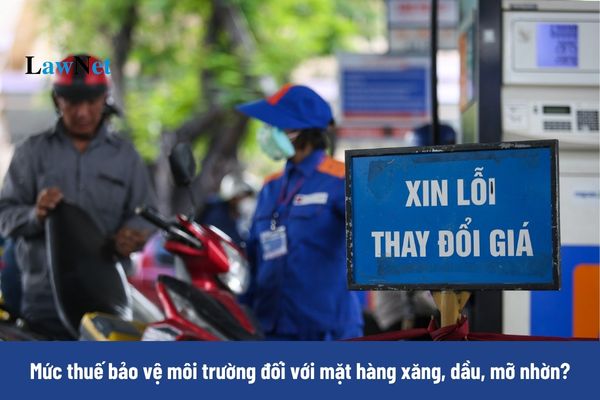From December 31, 2024: What are environmental protection tax rates applied to gasoline, oil, and lubricant in Vietnam in 2025?
What are environmental protection tax rates applied to gasoline, oil, and lubricant in Vietnam in 2025?
Pursuant to Article 1 of Resolution 42/2023/UBTVQH15, the environmental protection tax rates applied to gasoline, oil, and lubricant from January 1, 2024, to December 31, 2024, are as follows:
(i) Gasoline, excluding ethanol: 2,000 VND/liter.
(ii) Jet fuel: 1,000 VND/liter.
(iii) Diesel oil: 1,000 VND/liter.
(iv) Kerosene: 600 VND/liter.
(v) Mazut oil: 1,000 VND/liter.
(vi) Lubricant oil: 1,000 VND/liter.
(vii) Grease: 1,000 VND/kg.
Therefore, after December 31, 2024, the environmental protection tax rates applied to gasoline, oil, and lubricant from January 1, 2025, will continue to be enforced as per Section 1, Clause 1 of Article 1 of Resolution 579/2018/UBTVQH14, unless there are new regulations. Specifically:
(i) Gasoline, excluding ethanol: 4,000 VND/liter.
(ii) Jet fuel: 3,000 VND/liter.
(iii) Diesel oil: 2,000 VND/liter.
(iv) Kerosene: 1,000 VND/liter.
(v) Mazut oil: 2,000 VND/liter.
(vi) Lubricant oil: 2,000 VND/liter.
(vii) Grease: 2,000 VND/kg.

What are environmental protection tax rates applied to gasoline, oil, and lubricant in Vietnam in 2025? (Image from Internet)
How to declare environmental protection tax for gasoline, oil, and lubricants in Vietnam?
Based on Clauses 1 and 2, Article 7 of Circular 152/2011/TT-BTC, the tax declaration and payment are executed following the provisions of the Environmental Protection Tax Law, the Tax Administration Law, and guiding documents, specifically as follows:
(1) Tax Declaration Dossier:
The environmental protection tax declaration dossier is the declaration form number 01/TBVMT as per Circular 152/2011/TT-BTC and related documents.
For exported, imported, transited goods, and temporary import-re-export goods, the customs dossier is used as the environmental protection tax declaration dossier.
Organizations and individuals engaged in the production and business of goods are responsible for declaring environmental protection tax. If false declaration, fraud, or tax evasion is discovered, they will be handled according to tax administration laws.
(2) Location for Submission of Tax Declaration Dossier:
- For domestically produced goods (excluding domestically consumed coal of the Vietnam Coal and Mineral Industries Group and petrol trading), the taxpayer submits the environmental protection tax declaration dossier to the directly managing tax authority.
In cases where the taxpayer has a production facility that is liable for environmental protection tax in a different province or city from the headquarters, the declaration dossier is submitted to the tax authority managing the locality of the production facility.
- For imported goods (except for imported petrol for sale), the taxpayer submits the declaration dossier to the customs authority where clearance is conducted.
(3) Environmental Protection Tax Declaration:
- For goods produced for sale, exchange, internal consumption, gifting, promotion, or advertising, tax declaration, calculation, and payment are done monthly, following the Tax Administration Law.
If in a month no environmental protection tax is due, the taxpayer must still submit a declaration to the tax authority.
- For imported goods and goods subject to environmental protection tax under entrusted import, taxpayers declare, calculate, and pay tax per instance (except for imported petrol for sale).
The timing for declaring, calculating, and paying environmental protection tax for imports coincides with import tax procedures, except for imported petrol, which follows regulations in Clause 2, Article 7 of this Circular.
The deadline for environmental protection tax payment in this context aligns with import tax deadlines per the Tax Administration Law.
(4) Declaration and Payment of Environmental Protection Tax for Petrol and Oil:
Petroleum trading enterprises register, declare, and pay environmental protection tax to the state budget at local tax offices where they declare and pay VAT, specifically:
- Main petroleum trading companies that directly import, produce, process petroleum (collectively as main units) declare and pay tax at their headquarters' local tax authority for the volume of petroleum they directly export, sell, including internal consumption, exchange, entrusted import, or sale to external organizations or individuals outside the main unit's network (including companies with up to 50% shares held by the unit); except for sales or entrusted imports for other main petroleum trading companies.
- Subsidiary units with independent accounting belonging to the main units; branches of the main units; or joint-stock companies where main units hold controlling shares (over 50%), or their subsidiaries, or relevant branches declare and pay tax at their headquarters' local tax authority for petroleum volumes sold to external organizations or individuals.
- Other organizations directly importing, producing, or processing petroleum declare and pay tax at the local tax office where VAT is declared and paid upon the sale of petroleum.
- In cases where petrol used for biofuel blending has not declared environmental protection tax, when selling biofuels, the selling unit must declare and pay environmental protection tax as per the regulation.
What goods are exempt from environmental protection tax in Vietnam?
Pursuant to Article 4 of the Environmental Protection Tax Law 2010, certain entities are exempt from environmental protection tax:
- Goods not specified in Article 3 of this Law are not subject to environmental protection tax.
- Goods specified in Article 3 of this Law are exempt in the following cases:
+ Goods transported in transit or transshipped through Vietnam's border gates and borders in accordance with legal provisions, including goods transported from export countries to import countries through Vietnam border gates without import procedures into Vietnam or export procedures out of Vietnam; goods in transit through Vietnam's border gates and borders based on agreements between the Government of Vietnam and foreign governments or arrangements between authorized agencies or representatives of the Government of Vietnam and foreign governments as per legal regulations;
+ Goods temporarily imported for re-export within the time limits prescribed by law;
+ Goods directly exported by production facilities or entrusted to export business establishments, excluding cases where organizations, households, individuals purchase goods subject to environmental protection tax for export.

